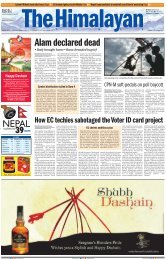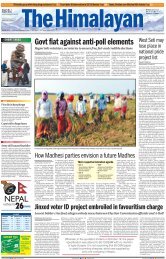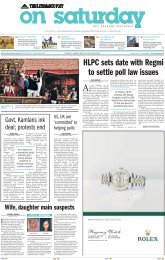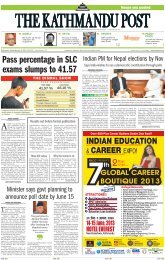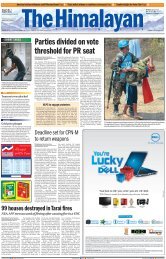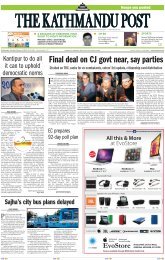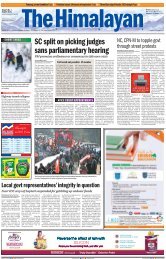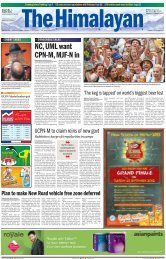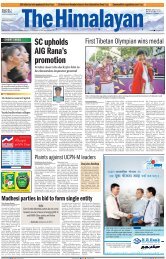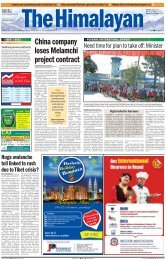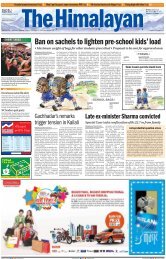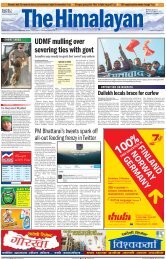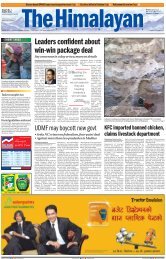Govt officials set to skip Geneva UN rights meet
Govt officials set to skip Geneva UN rights meet
Govt officials set to skip Geneva UN rights meet
You also want an ePaper? Increase the reach of your titles
YUMPU automatically turns print PDFs into web optimized ePapers that Google loves.
6<br />
EDITORIAL<br />
Road <strong>to</strong> elections<br />
Major parties need <strong>to</strong> reach out <strong>to</strong> give<br />
smaller parties political ownership<br />
ALTHOUGH the major political parties seem closer<br />
<strong>to</strong> a deal on elections than they have been for the<br />
past eight months, it is still unclear whether the<br />
Chief Justice will agree <strong>to</strong> take up leadership of the election<br />
government. While all of the nation’s attention is<br />
focused on this issue, what has received far less attention<br />
is that there are political fac<strong>to</strong>rs that could still block elections.<br />
In particular, there are many small political parties<br />
that feel left out from the current negotiation process. The<br />
larger parties in all likelihood assume that once they sort<br />
out a deal, it will be easy <strong>to</strong> get the smaller parties on<br />
board. This may be generally true. After all, many of the<br />
smaller parties also have a lot <strong>to</strong> gain from elections. But<br />
there are certain political groups that may not be as easy<br />
<strong>to</strong> negotiate with. The larger parties would do well <strong>to</strong> start<br />
negotiating with them soon if they want elections by June.<br />
One major problem that has often been commented<br />
on is the issue of re-delineating constituencies and updating<br />
voter rolls. This could be a major problem, especially<br />
in the Tarai. Many of the Madhesi parties that are currently<br />
in government seem <strong>to</strong> have no problem with the current<br />
plans of the larger parties. But there are some<br />
Madhesi groups that might not be so amenable. Upendra<br />
Yadav’s party, which still enjoys considerable support in<br />
the Tarai, is a case in point. If his group feels excluded<br />
from negotiations, it could well raise an agitation in the<br />
Tarai and refuse <strong>to</strong> participate in elections unless Madhesi<br />
concerns such as the re-delineation of constituencies are<br />
conducted. This in turn may cause the Madhesi parties in<br />
government <strong>to</strong> <strong>set</strong> their own preconditions for participating<br />
in elections. The larger parties need <strong>to</strong> start addressing<br />
these concerns as soon as possible.<br />
The other party that will likely cause problems is the<br />
breakaway Maoist party led by Mohan Baidya. This party<br />
is facing internal problems regarding their future strategy.<br />
Its leaders also feel left out of the negotiating process and<br />
are aggrieved. If they continue <strong>to</strong> feel this way, it is possible<br />
that they will do all they can <strong>to</strong> thwart an election deal.<br />
They may even engage in acts of violence and intimidation<br />
<strong>to</strong> prevent elections. In order <strong>to</strong> prevent this, the big<br />
parties need <strong>to</strong> reach out <strong>to</strong> them and listen <strong>to</strong> their concerns.<br />
Efforts need <strong>to</strong> be made <strong>to</strong> convince them that<br />
there is no other option but <strong>to</strong> hold elections. Given their<br />
common his<strong>to</strong>ry, it would be best if Maoist Chairman<br />
Pushpa Kamal Dahal deals with Baidya in private. There<br />
are many challenges that need <strong>to</strong> be overcome if elections<br />
are <strong>to</strong> be held in June. The major parties need <strong>to</strong> be aware<br />
and address all of them if they are genuinely committed <strong>to</strong><br />
holding elections.<br />
WE in Nepal have given more<br />
importance <strong>to</strong> the SLC<br />
examination than is actually<br />
necessary. The SLC has become<br />
almost the first indica<strong>to</strong>r of education.<br />
Obviously, a huge fear and anxiety is<br />
associated with the SLC. Because of<br />
HEM RAI Hemrai21@yahoo.com<br />
our social schooling, we have a<br />
propensity <strong>to</strong> judge a student on the<br />
basis of the grades he or she secures in<br />
the examination but not on the basis<br />
of his or her competency.<br />
In the process of moving up from<br />
grade one <strong>to</strong> grade 10, one has likely<br />
accumulated lots of experience of<br />
appearing in examinations. Students<br />
are usually frightened, intimidated<br />
and even terrorised by the words like<br />
‘terminal examinations’ and ‘final<br />
examinations’ in one way or the other.<br />
There is <strong>to</strong>ugh and sometimes cutthroat<br />
competition at present in the<br />
education sec<strong>to</strong>r. Different schools<br />
and students prepare for the SLC differently.<br />
The expectations of parents,<br />
Learning<br />
a little<br />
the student’s own ambition and norms<br />
of the society open up different paths<br />
of progress, but at the same time, that<br />
may create huge tension and contradictions.<br />
Psychologically, exam-phobia<br />
is such a problem that affects the tender<br />
mind of the youth both physically<br />
and mentally.<br />
Students who have <strong>set</strong> goals <strong>to</strong> do<br />
well in the SLC work hard year-long.<br />
But examination time brings about the<br />
feelings of fear, tension, anxiety and<br />
uncertainty. Students often lose their<br />
appetite and suffer from other problems<br />
like insomnia, headache, fatigue<br />
and fever. Anxiety actually makes the<br />
filter that is inside our brain, in<br />
between the receiving and production<br />
areas, more active in blocking the<br />
channels between star shaped cells<br />
and pyramid shaped cells. As a result,<br />
the students’ memory power may<br />
become even weaker.<br />
Many students become the victim<br />
of depression when they do not score<br />
high marks in the examination in spite<br />
of their hard work. Our social structure<br />
and schooling is such that one is considered<br />
<strong>to</strong> be an intelligent or a dull<br />
student on the basis of the marks one<br />
obtains in examinations. This mounts<br />
a huge pressure on students.<br />
Examinations thus become a fac<strong>to</strong>r of<br />
intense fear for the students and not a<br />
MADHESIS should not be seen<br />
as the spoilers of the election.<br />
But the voter list and the constituency<br />
are two real substantive things<br />
that need <strong>to</strong> be sorted out. Making a<br />
compromise on these issues can be sui-<br />
DIPENDRA JHA<br />
cidal for the United Democratic<br />
Madhesi Front (UDMF). The Madhesi<br />
political representation would be narrowed<br />
in the upcoming election as one<br />
in every three persons would be disenfranchised<br />
in Madhes districts. Almost<br />
three million missing voters are from<br />
the Tarai among the 4.6 million eligible<br />
voters who have not been registered in<br />
the citizenship-based voter list.<br />
If polls are not held according <strong>to</strong> the<br />
2008 election voter list, a large number<br />
of Madhesi leaders would be badly<br />
affected and so will be the voters. Jay<br />
Ram Yadav’s vic<strong>to</strong>ry in Upendra Yadav’s<br />
constituency in Mornag in the by-election<br />
is a clear example <strong>to</strong> support this<br />
argument. In every constituency in the<br />
Tarai, about 10,000 eligible voters are<br />
supposedly missing from the voter list.<br />
The picture is pretty much clear if you<br />
compare the latest Census data of the<br />
eligible voters with the district voter registration<br />
data mentioned in the book<br />
Voter Registration System in Nepal by<br />
Ayodhee Prasad Yadav, (pages 89, 90, 91<br />
and 92). Look at the missing voters’ percent<br />
on a district-wise basis—Morang<br />
29.67 percent, Sunsari 32 percent,<br />
Rauthat 34.5 percent, Bara 32.08 percent,<br />
Parsa 35.08 percent, Nawalparasi<br />
28.64 percent, Rupendhi 37.15 percent,<br />
Kapilbastu 36.55 percent, Saralahi 34.64<br />
percent, Mahottari 31.45 percent and<br />
Dhanusha 31.93 percent.<br />
About 33 percent of eligible voters or<br />
100, 000 voters will be barred from<br />
enjoying their <strong>rights</strong> <strong>to</strong> vote in the election.<br />
This gap in the voter registration is<br />
also justified by the Dhanapati<br />
Upadhaya Commission, formed by the<br />
Government of Nepal in 1995 <strong>to</strong> address<br />
statelessness. That shows that more<br />
than 3.4 million people were stateless<br />
due <strong>to</strong> the lack of citizenship certificates.<br />
On November 3, 2010 the Supreme<br />
Voters and constituencies<br />
Guaranteeing Madhesis the right <strong>to</strong> vote <strong>to</strong> participate in<br />
political affairs is an important responsibility of the state<br />
Court denied the petitioner’s request <strong>to</strong><br />
overrule the Election Commission’s citizenship<br />
certificate requirement <strong>to</strong> be<br />
eligible <strong>to</strong> register <strong>to</strong> vote. The court<br />
holds that the EC’s November 2 amendment<br />
provides a remedy for those<br />
Nepalis without citizenship certificates.<br />
On December 23, 2010, the Supreme<br />
Court rules that the ECN can: 1) prepare<br />
new voter rolls, as opposed <strong>to</strong> only<br />
updating the current rolls; 2) register<br />
Nepalis who are 16- and 17-years old; 3)<br />
collect personal details for the government’s<br />
national identity card project;<br />
and 4) collect pho<strong>to</strong>graphs as part of the<br />
registration procedure.<br />
However, in the final decision in<br />
February 2011, the Supreme Court ruled<br />
that: 1) only citizenship certificates<br />
could prove eligibility for registering <strong>to</strong><br />
vote; 2) if the validity of a citizenship<br />
certificate was in question, other government-issued<br />
documents could be<br />
proffered <strong>to</strong> confirm its legitimacy, but<br />
they could not establish eligibility for<br />
registration; and 3) the Ministry of<br />
Home Affairs must distribute citizenship<br />
certificates <strong>to</strong> those who do not<br />
have them. As per the SC directive, can<br />
the government distribute citizenship <strong>to</strong><br />
4.6 million eligible voters who have not<br />
registered in the citizenship-based voter<br />
identity card within two months? If not,<br />
requiring the citizenship certificate for<br />
voting is against the fundamental principle<br />
of right <strong>to</strong> voting because there is<br />
extensive discrimination against<br />
Madhesis in getting access <strong>to</strong> the citizenship<br />
certificate.<br />
For the 2008 elections the EC had<br />
registered 17.6 million voters, but current<br />
figures stand at 11 million. The<br />
large number of voters <strong>to</strong> be registered<br />
under the new system decreased in the<br />
absence of citizenship certificates. Here,<br />
it is important <strong>to</strong> remember that the 22point<br />
agreement between the<br />
Government of Nepal and the Madhesi<br />
People’s Right Forum on August 30, 2007<br />
which assured that the former would<br />
“end all aspects of discrimination<br />
against Madhesis so as <strong>to</strong> create an environment<br />
inclusive of Madhesis and all<br />
Nepali people in the national mainstream.”<br />
Then PM Girija Prasad Koirala<br />
signed the agreement <strong>to</strong> “solve problems<br />
related <strong>to</strong> citizenship by redeploying<br />
the Citizenship Distribution Teams<br />
<strong>to</strong> the villages for easy and accessible<br />
distribution of the citizenship certificates.”<br />
The problem is not only in the Tarai.<br />
SLC phobia<br />
THE KATHMANDU POST | FRIDAY, FEBRUARY 22, 2013<br />
A large number of people in the hilly<br />
region are facing a similar problem.<br />
Thus this is not an issue of who is Pahadi<br />
and Madhesi; it is a question of the fundamental<br />
political right of an individual,<br />
who is eligible <strong>to</strong> get citizenship but still<br />
does not possess the card, who consequently<br />
will miss the opportunity <strong>to</strong> cast<br />
his or her vote in the upcoming election.<br />
The latest Census report also shows<br />
that the ratio of population has<br />
increased in Tarai from 49 percent <strong>to</strong> 51<br />
percent meaning there’s reason also <strong>to</strong><br />
increase the number of constituencies.<br />
One constituency is needed <strong>to</strong> be added<br />
in Tarai districts such as Sarlahi,<br />
Rautahat, Jhapa, Rupandehi and<br />
Sunsari. Right <strong>to</strong> vote is the essence of<br />
democracy. But it is difficult <strong>to</strong> understand<br />
why the UML and Nepali<br />
Congress, and even the UCPN (Maoist),<br />
oppose the UMDF proposal <strong>to</strong> give<br />
legality <strong>to</strong> the old voter registration list<br />
and increase more constituencies in the<br />
Tarai.<br />
“There is a widespread complaint<br />
that thousands of Indians received<br />
Nepali citizenship certificate,” they say.<br />
If that’s true, who did that? The majority<br />
of them are hill-Brahmin Chief District<br />
Officers (CDOs) who made money out<br />
of the citizenship business. Where is<br />
their so-called ‘national loyalty’ when<br />
they distributed the citizenship <strong>to</strong><br />
Indians? For the CDOs’ faults and weak<br />
control mechanisms, genuine Madhesis<br />
cannot be punished. These people had<br />
voted in the past elections without citizenship.<br />
How can the faulty laws s<strong>to</strong>p<br />
them in future from enjoying the same<br />
right?<br />
Another allegation is that “the<br />
Madhesis want <strong>to</strong> give citizenship cer-<br />
A few steps could easily cut away at all the stress and fear associated with the SLC<br />
PRAYASH RAJ KOIRALA<br />
THE public buses in Bangalore are often as<br />
packed as the public transport in<br />
Kathmandu. There are also rare occasions<br />
where I have felt like being in Kathmandu when<br />
I had <strong>to</strong> stay squeezed inside the bus and smell<br />
the horrible sweat of a person beside me.<br />
However, it is more comfortable travelling<br />
around in the Bangalore Metropolitan Transport<br />
Corporation (BMTC) buses rather than in the<br />
public vehicles around Kathmandu — the difference<br />
of one being public and the other being privately<br />
owned.<br />
The buses that run around Bangalore are<br />
managed by the Karnataka state government;<br />
whereas, the buses around Kathmandu are<br />
under the control o the businessmen and the<br />
private transport organisations. Thus, the state<br />
managed transport is service oriented and here,<br />
the privately owned transport of our country is<br />
profit oriented. However, there are a lot of things<br />
which can be learnt from the transport system of<br />
our neighbouring nation and can be implemented<br />
in order <strong>to</strong> improvise the transport system of<br />
Kathmandu.<br />
The greatest difference is<br />
that, in Kathmandu, the<br />
buses run after the passengers.<br />
To the contrary, people<br />
have <strong>to</strong> run after the buses in Bangalore. There is<br />
no one who comes out of the bus at each bus<br />
s<strong>to</strong>p or at the door banging the doors and inviting<br />
the passengers in Bangalore. A bus only s<strong>to</strong>ps<br />
only if there is someone <strong>to</strong> drop off or if there is<br />
someone waiting at the bus s<strong>to</strong>p. This has helped<br />
POST PHOTO<br />
postplatform<br />
means <strong>to</strong> evaluate what they’ve learnt.<br />
To combat SLC phobia, first of all,<br />
it is essential <strong>to</strong> control the fear of<br />
examinations. No external fac<strong>to</strong>r can<br />
help the students in this respect. How<br />
can one control this fear? The best way<br />
<strong>to</strong> do it is through preparation. If one is<br />
well prepared and confident, then worries<br />
and anxiety will take up less room<br />
in the mind. A balanced and nutritious<br />
diet is also really important. An empty<br />
s<strong>to</strong>mach only fuels fear and anxiety.<br />
Food rich in iron and protein (amala,<br />
chana- gram, raharko daal, dry fruits,<br />
including almonds) should be included<br />
in the diet as they are considered<br />
‘brain foods’. A glass of cold water after<br />
every hour of study can act as a quick<br />
refreshing agent. Recently, it has been<br />
proved scientifically that water can be<br />
regarded as brain food <strong>to</strong>o.<br />
Self confidence is the main key <strong>to</strong><br />
success in life. That also goes for<br />
examinations. Now the question arises:<br />
how can one build up self confidence?<br />
As far as I am concerned, the<br />
best and the only way <strong>to</strong> gain self-confidence<br />
is <strong>to</strong> study the curriculum<br />
deeply and fully by strictly following a<br />
time table <strong>set</strong> by the students themselves.<br />
Relying on guess papers or<br />
guide books available in the market is<br />
perhaps one of the worst ways <strong>to</strong> prepare<br />
for the SLC. A throrough under-<br />
<strong>to</strong> avoid the traffic jams on the places where the<br />
roads are small.<br />
The effort of the state in order <strong>to</strong> avoid the<br />
incidents of sexual harassments of girls is praise<br />
worthy. Almost 40 percent of the seats in the<br />
front part of the buses are the reservation seat for<br />
females. The open space beside the reserved<br />
seats in the front is only for the females <strong>to</strong> stand<br />
comfortably. Moreover,<br />
there is a separate door for<br />
females <strong>to</strong> get in<strong>to</strong> the bus<br />
so that they can avoid the<br />
<strong>to</strong>uching and pushing of ill-mannered mans<br />
during the rush hours.<br />
Regular users of buses can benefit from the<br />
system of ‘Buss Pass’. Anyone can get a bus pass<br />
from the conduc<strong>to</strong>r of the bus paying reasonable<br />
charges. These passes allow us <strong>to</strong> travel around<br />
tificates <strong>to</strong> as many Indians as possible<br />
so that these foreigners could be a<br />
promising vote-bank for them.” But just<br />
look at the economic boom in Bihar: no<br />
Bihari will be interested anymore in<br />
coming <strong>to</strong> the poor and insecure region<br />
of Nepal Tarai. These types of stereotypical<br />
Mahendrabadi thoughts have no<br />
substantive rationality.<br />
If the United Democratic Madhesi<br />
Front (UMDF) compromise on these<br />
two genuine issues, they will lose their<br />
legitimacy in the Madhesi constituencies.<br />
They would be co-opted in<strong>to</strong> the<br />
political polarisation of the status quo,<br />
the power-seekers and opportunists. It<br />
does not matter whether the election is<br />
held in June or November. But guaranteeing<br />
the right <strong>to</strong> vote <strong>to</strong> participate in<br />
political affairs for all citizens is an<br />
important responsibility of the state.<br />
The principles of universal and equal<br />
suffrage such as the Universal<br />
Declaration on Human Rights and the<br />
International Covenant on Civil and<br />
Political Rights, prohibits unreasonable<br />
limitations of an individual’s <strong>rights</strong> <strong>to</strong><br />
vote. Restricting the Madhesi population<br />
who are willing <strong>to</strong> vote using socalled<br />
legal, administrative and practical<br />
obstacles are not justified on any<br />
grounds. It is hard <strong>to</strong> get official records<br />
in a short span of time. Documents like<br />
birth and marriage certificates, residency,<br />
housing, land and property records<br />
are needed <strong>to</strong> acquire citizenship and<br />
getting them takes time. That’s why we<br />
need <strong>to</strong> accept the 2008 voter registration<br />
list that <strong>to</strong>ok in<strong>to</strong> account the situation<br />
of the Madhesis, including their<br />
lack of access <strong>to</strong> citizenship certificates.<br />
Jha is an advocate at the Supreme Court<br />
standing of the entire curriculum will<br />
go much further in giving students the<br />
confidence boost they need.<br />
Otherwise, they will forever be worrying<br />
about whether the questions in the<br />
guess paper will appear in the actual<br />
examination or not.<br />
Once one actually makes it <strong>to</strong> the<br />
exam hall how then do you solve the<br />
problems and answer the questions?<br />
This is a million dollar question. Prior<br />
<strong>to</strong> writing answers students should<br />
properly understand the questions<br />
first. Reading all the questions with a<br />
cool mind (perhaps take several long<br />
breaths from the nose) is very important<br />
so you know what it is exactly you<br />
are being asked <strong>to</strong>. Another really<br />
important thing is always <strong>to</strong> start with<br />
questions that are easy or which the<br />
student feels comfortable answering.<br />
Trying <strong>to</strong> tackle the hard ones first<br />
means that there might not be enough<br />
time at the end <strong>to</strong> answer the easy<br />
ones or that all the mental energy is<br />
already spent trying <strong>to</strong> answer the long<br />
and hard questions first.<br />
The SLC is not an iron gate. It is<br />
simply an exam and the sooner students<br />
can internalise this, the better<br />
they are likely <strong>to</strong> perform in it.<br />
Rai is associated with the Career Building<br />
International Academy<br />
in any of the BMTC buses for free for a day (with<br />
a day pass) or for a month (with a monthly pass).<br />
Moreover, students who regularly use the public<br />
bus <strong>to</strong> get <strong>to</strong> the school or college from their residence<br />
can also benefit with special bus pass for<br />
students. There are several other bus passes for<br />
the physically challenge people and disabled<br />
people.<br />
Special attention has been made <strong>to</strong>wards the<br />
safely of the passengers by keeping an au<strong>to</strong>matic<br />
door lock system. Thus, the passengers can get<br />
down the bus only after acknowledging the driver<br />
at designated bus s<strong>to</strong>ps.<br />
Many of these systems of Bangalore are<br />
feasible for Kathmandu <strong>to</strong>o. These small changes<br />
can definitely make a huge difference and ease<br />
the transport problems faced by the<br />
Kathmanduties.



